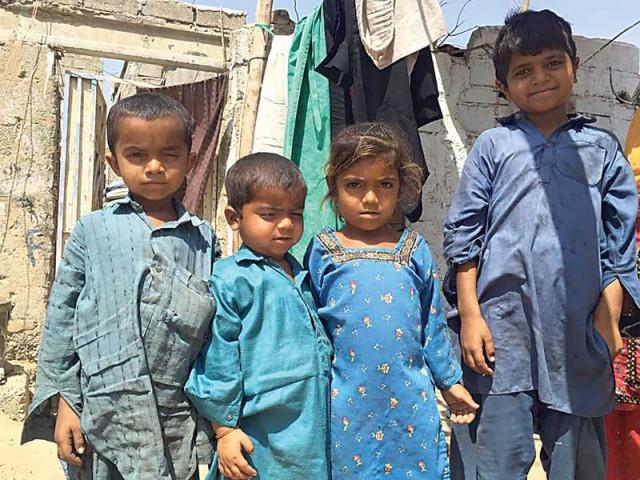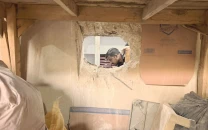A city divided — how to seek inclusive growth?
The model provides a glimpse into a much larger footprint that exists

While informal settlements are nothing new for Karachi, what is alarming is that there seems to be no more desire or effort to have them regularised. PHOTO: COURTESY LAIBA KHAN
The settlement, situated in a largely middle to upper-middle income locality, comprised 100 shanty houses (jhugiis) and was settled in about five years ago. It comprises people who migrated from southern Punjab in the wake of the 2011 floods.
Since it is an informal settlement, legal access to civic services and related infrastructure is not possible. However, that does not mean the services are not being accessed. The model provides a glimpse into a much larger footprint that exists, leading to the development of a substantial parallel economy and human settlement dynamics having their own rules of engagement.
Leaving no one behind: ‘Poor have as much claim on Karachi as upper classes’
While informal settlements are nothing new for Karachi, what is alarming is that there seems to be no more desire or effort to have them regularised. The government's continuous failure to provide viable low income housing for the poor and marginalised led to the communities taking matters into their own hands and trying to improve their housing and services themselves. The Orangi Pilot Project (OPP) laid the foundations of community help-based housing and services improvement initiatives, particularly for water and sanitation services. At that time, there was a desire for things to be formalised and for the status quo to change.
Partnerships were created between the OPP and the Sindh Katchi Abadi Authority to see how processes and mechanisms could be established to regularise the settlements. Extensive mapping was done and models were developed to create an internal and external model for services such as sewerage, where the communities lay the internal line and primary networks and the public utility then links that with the tertiary infrastructure. Then, initiatives such as formal housing schemes like Khuda Ki Busti in Hyderabad were undertaken that tried to benefit from the success of the informal housing enterprises by adjusting and mainstreaming in the official policy frameworks, the processes in use in informal housing. These efforts were not always successful but it was a process that held hope for a better future for millions of city inhabitants.
However, over a period of time, the informal settlement patterns and contexts have changed with greater politicisation of the process linked with alarming erosion in the writ of the state. Now, there is much to be made by maintaining the status quo - for both informal and formal operators. Growing levels of rent and political and ethnic interfaces have now seriously reduced chances of such settlements becoming part of the formalised planning and development process. As such, now an alternate development construct, undocumented and unregulated, with its own rules of parallel engagement in terms of access to land and services, financing and security has been established. This construct is now hindering and sabotaging formalisation of systems, damaging the physical and natural environment and the huge social consequences are also not documented but are evident in the way the city is being defiled physically and is becoming more violent and less inclusive.
Establishment of katchi abadis: FIA arrests former CDA enforcement director
This dynamic is likely to increase in the coming years with Karachi, despite all its problems, continuing to attract more migrants. The process has also been politicised, which makes it more difficult to find a consensus that can lead to positive change.
The political fault lines are getting merged with ethnic divisions characterising Karachi's populace and the cultural, linguistic, ethnic, religious diversities, rather than becoming a source of celebration, are instead determining the fault lines for divide and contestations.
The only solution to this crisis lies in the forging of a political will and consensus among the power brokers of the city with a vision of an inclusive city that serves all and is served by all.
The writer is an urban planner and runs a non-profit organisation based in Karachi city focusing on urban sustainability issues. He can be reached at fanwar@sustainableinitiatives.org.pk
Published in The Express Tribune, March 28th, 2016.



















COMMENTS
Comments are moderated and generally will be posted if they are on-topic and not abusive.
For more information, please see our Comments FAQ